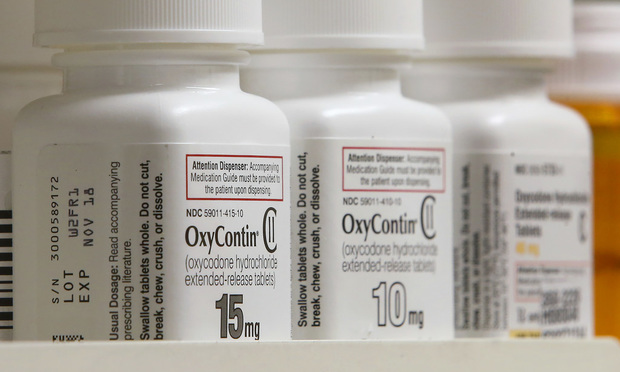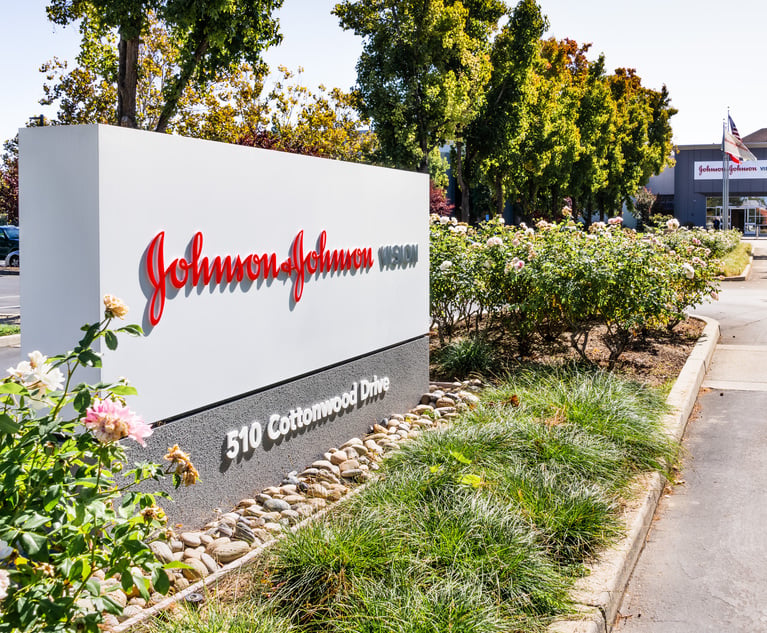Pa. AG Sues OxyContin Maker Purdue Pharma Over Opioid Epidemic
Accusing the manufacturer of the painkiller OxyContin of sparking the opioid epidemic in the Keystone State, Pennsylvania Attorney General Josh Shapiro has filed a lawsuit against Purdue Pharma.
May 15, 2019 at 03:18 PM
4 minute read
 OxyContin medication sit on a pharmacy shelf in Provo, Utah, on Aug. 31, 2016. Photo: George Frey/Bloomberg
OxyContin medication sit on a pharmacy shelf in Provo, Utah, on Aug. 31, 2016. Photo: George Frey/Bloomberg
Accusing the manufacturer of the painkiller OxyContin of sparking the opioid epidemic in the Keystone State, Pennsylvania Attorney General Josh Shapiro has filed a lawsuit against Purdue Pharma.
The lawsuit was filed in the Commonwealth Court under the state Consumer Protection Law and Unfair Trade Practices Law and seeks $1,000 for each violation of the statute, increasing to $3,000 for each violation that involved a victim over 60 years of age.
“Our communities and families have been devastated by the opioid epidemic, which takes 12 Pennsylvania lives per day,” Shapiro said in a statement. “There is nothing natural about this epidemic—it was manufactured in part by Purdue Pharma, as the company deceptively marketed OxyContin despite knowing the risk of addiction. While Pennsylvania paid the price, Purdue made more than $35 billion in revenue. We're taking action to hold them accountable for their greed and the devastation they pushed for profit.”
“Purdue acted with brazen disregard for the public health hazard they were creating, choosing to maximize profits while putting Pennsylvanians' lives at risk and ignoring suspicious prescribing practices by doctors,” Shapiro added. “They targeted the most vulnerable Pennsylvanians, including our seniors and veterans, and aggressively pushed doctors to prescribe unnecessary levels of opioids. All along, they knew how dangerous their drugs were and they knew that their claims were deceptive—and that violates the laws of our commonwealth.”
A spokesman for Purdue said the company denies the allegations against it.
“The complaint is part of a continuing effort to try these cases in the court of public opinion rather than the justice system,” the spokesman said. “Such allegations demand clear evidence linking the conduct alleged to the harm described, but we believe the state fails to show such causation and offers little evidence to support its sweeping legal claims.”
Shapiro's suit alleges Purdue embarked on a multiyear illegal marketing campaign geared toward deceiving doctors and patients as to the drug's addictive properties.
“For more than two decades, Purdue spent millions of dollars targeting high-prescribing physicians to make sure they prescribed increasingly higher amounts of its drugs,” the complaint alleges. “Purdue deceived Pennsylvania doctors about the risks of opioids, pushed them to keep patients on Purdue drugs longer, and kept promoting opioids to prescribers who wrote illegitimate prescriptions—even when their patients became addicted or died.”
Days ago, Shapiro joined 43 other state attorneys general in an antitrust lawsuit against 20 makers of generic drugs and 15 individuals, claiming the companies conspired to fix prices for more than 100 medications. The case is spearheaded by Connecticut Attorney General William Tong.
The lawsuit—filed May 10 in the U.S. District Court for the District of Connecticut—alleges Teva Pharmaceuticals USA Inc., Pfizer Inc., Sandoz Inc., Mylan Pharmaceuticals Inc., Lannett and other companies have conspired since at least 2012 to fix the prices on well-known drugs like Niacin ER tablets, Warfarin sodium tablets and Omega-3 acid ethyl esters. The drugs span all types, including tablets, capsules, suspensions, creams, gels, ointments and classes, including statins and antidepressants.
Teva, Mylan and Lannett all have U.S. headquarters in Pennsylvania.
The 524-page lawsuit includes emails, telephone calls and texts allegedly showing competitors working together to fix prices on the drugs.
In addition to Connecticut and Pennsylvania, other plaintiffs include Delaware, Florida, New York and New Jersey.
This content has been archived. It is available through our partners, LexisNexis® and Bloomberg Law.
To view this content, please continue to their sites.
Not a Lexis Subscriber?
Subscribe Now
Not a Bloomberg Law Subscriber?
Subscribe Now
NOT FOR REPRINT
© 2025 ALM Global, LLC, All Rights Reserved. Request academic re-use from www.copyright.com. All other uses, submit a request to [email protected]. For more information visit Asset & Logo Licensing.
You Might Like
View All
Ozempic Defendants Seek to Shave 'Tacked On' Claims From MDL Complaint
3 minute read
Plaintiff Argues Jury's $22M Punitive Damages Finding Undermines J&J's Talc Trial Win
4 minute read
'Discordant Dots': Why Phila. Zantac Judge Rejected Bid for His Recusal
3 minute read
Pittsburgh Jury Tries to Award $22M Against J&J in Talc Case Despite Handing Up Defense Verdict
4 minute readTrending Stories
- 1Uber Files RICO Suit Against Plaintiff-Side Firms Alleging Fraudulent Injury Claims
- 2The Law Firm Disrupted: Scrutinizing the Elephant More Than the Mouse
- 3Inherent Diminished Value Damages Unavailable to 3rd-Party Claimants, Court Says
- 4Pa. Defense Firm Sued by Client Over Ex-Eagles Player's $43.5M Med Mal Win
- 5Losses Mount at Morris Manning, but Departing Ex-Chair Stays Bullish About His Old Firm's Future
Who Got The Work
J. Brugh Lower of Gibbons has entered an appearance for industrial equipment supplier Devco Corporation in a pending trademark infringement lawsuit. The suit, accusing the defendant of selling knock-off Graco products, was filed Dec. 18 in New Jersey District Court by Rivkin Radler on behalf of Graco Inc. and Graco Minnesota. The case, assigned to U.S. District Judge Zahid N. Quraishi, is 3:24-cv-11294, Graco Inc. et al v. Devco Corporation.
Who Got The Work
Rebecca Maller-Stein and Kent A. Yalowitz of Arnold & Porter Kaye Scholer have entered their appearances for Hanaco Venture Capital and its executives, Lior Prosor and David Frankel, in a pending securities lawsuit. The action, filed on Dec. 24 in New York Southern District Court by Zell, Aron & Co. on behalf of Goldeneye Advisors, accuses the defendants of negligently and fraudulently managing the plaintiff's $1 million investment. The case, assigned to U.S. District Judge Vernon S. Broderick, is 1:24-cv-09918, Goldeneye Advisors, LLC v. Hanaco Venture Capital, Ltd. et al.
Who Got The Work
Attorneys from A&O Shearman has stepped in as defense counsel for Toronto-Dominion Bank and other defendants in a pending securities class action. The suit, filed Dec. 11 in New York Southern District Court by Bleichmar Fonti & Auld, accuses the defendants of concealing the bank's 'pervasive' deficiencies in regards to its compliance with the Bank Secrecy Act and the quality of its anti-money laundering controls. The case, assigned to U.S. District Judge Arun Subramanian, is 1:24-cv-09445, Gonzalez v. The Toronto-Dominion Bank et al.
Who Got The Work
Crown Castle International, a Pennsylvania company providing shared communications infrastructure, has turned to Luke D. Wolf of Gordon Rees Scully Mansukhani to fend off a pending breach-of-contract lawsuit. The court action, filed Nov. 25 in Michigan Eastern District Court by Hooper Hathaway PC on behalf of The Town Residences LLC, accuses Crown Castle of failing to transfer approximately $30,000 in utility payments from T-Mobile in breach of a roof-top lease and assignment agreement. The case, assigned to U.S. District Judge Susan K. Declercq, is 2:24-cv-13131, The Town Residences LLC v. T-Mobile US, Inc. et al.
Who Got The Work
Wilfred P. Coronato and Daniel M. Schwartz of McCarter & English have stepped in as defense counsel to Electrolux Home Products Inc. in a pending product liability lawsuit. The court action, filed Nov. 26 in New York Eastern District Court by Poulos Lopiccolo PC and Nagel Rice LLP on behalf of David Stern, alleges that the defendant's refrigerators’ drawers and shelving repeatedly break and fall apart within months after purchase. The case, assigned to U.S. District Judge Joan M. Azrack, is 2:24-cv-08204, Stern v. Electrolux Home Products, Inc.
Featured Firms
Law Offices of Gary Martin Hays & Associates, P.C.
(470) 294-1674
Law Offices of Mark E. Salomone
(857) 444-6468
Smith & Hassler
(713) 739-1250





